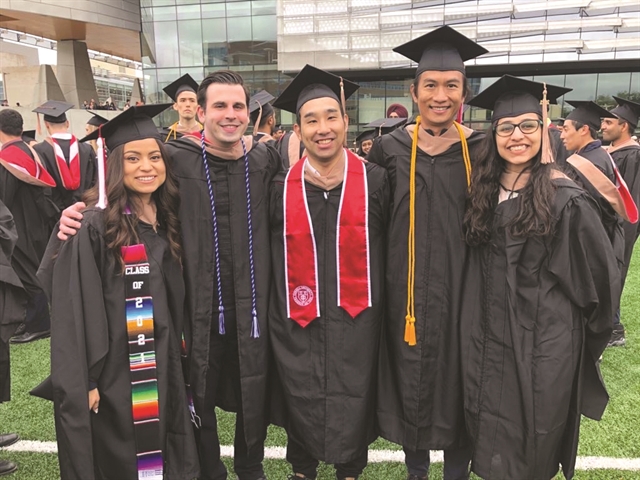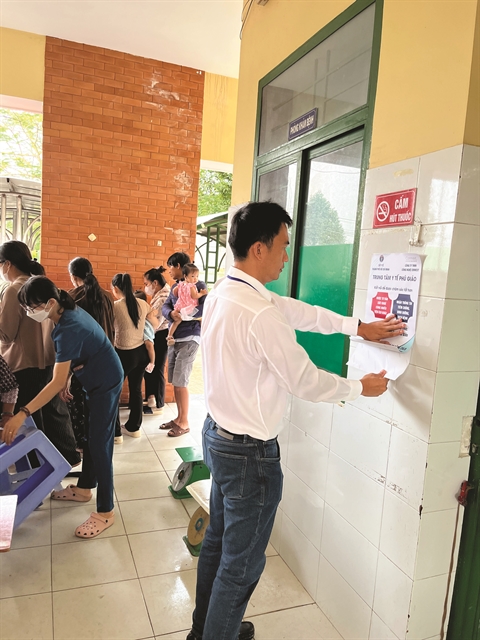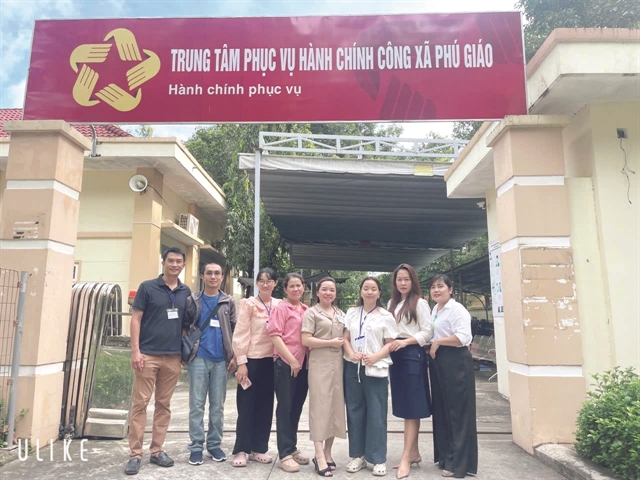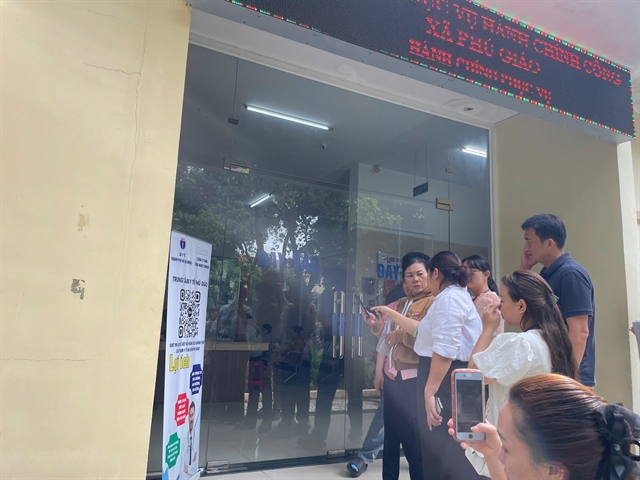Weather:
- Ha Noi 25oC
- Da Nang 25oC
- Ho Chi Minh 25oC

From a modest upbringing in HCM City to studies in Norway and the US and a career in Canada, Vietnamese-Canadian Dr Nguyễn Anh Tuấn, an informaticist, has come full circle — returning to Việt Nam with a mission to harness artificial intelligence (AI) to strengthen healthcare and bring better care to everyday communities. Bồ Xuân Hiệp reports.
Bồ Xuân Hiệp
At An Bình Phú Giáo Medical Station in former Bình Dương Province (now part of enlarged HCM City) in southern Việt Nam, a simple poster has been pinned to the wall.
It reads Connext, an AI-powered communication platform designed to support grassroots healthcare.
For most patients walking by, it may look like just another notice about a new service. But for Vietnamese-Canadian Dr Nguyễn Anh Tuấn, 42, that poster symbolises something much greater: the reason he came home.
The son of a war veteran and a schoolteacher, Tuấn was born in Thanh Hóa Province in northern Việt Nam. At the age of two, he moved with his family to Bình Dương, where he grew up in a modest household that valued education above all else.
His father, a soldier from northern Việt Nam who once served in Cambodia, taught him resilience. His mother, a secondary school teacher, instilled compassion and a belief in the transformative power of learning.
Those lessons propelled him far from home. After completing the gifted programme, Tuấn earned his Bachelor of Science in Computer Science with distinction from HCM City University of Technology.
In 2007, he left Việt Nam to pursue a PhD in Informatics at the University of Oslo, Norway — the start of a long journey through Europe and North America.
“I have always believed the best way for me is to apply what I learn in one country to another,” Tuấn recalls. “Living abroad helped me see both Việt Nam’s competitive strengths and its challenges.”
Tuấn’s first return came in 2011 when he founded a software company in HCM City. Starting with just himself, he grew it into a team of over 70 engineers before selling it in 2018 to a Japanese software company — an exit that allowed him to explore new opportunities.
He later pursued an MBA at Cornell University, then worked in venture capital in the US before moving to Canada.
In Canada, Tuấn deepened his understanding of healthcare, digital transformation, and data privacy, knowledge that would later prove invaluable in Việt Nam.
Yet, despite the professional success, something was missing. “I saw the positive impact I could create in Việt Nam through digital transformation in general, and AI in particular,” he says.

Life-changing decision
At the end of 2024, after six years in Canada, Tuấn made the life-changing decision to return to Việt Nam. This time, his vision was bigger: to improve community health through technology.
Together with long-time friend Mai Trần, PhD, whom he first met during their studies in Oslo, he co-founded Connext.
While Tuấn had followed an entrepreneurial path, Mai had spent 12 years at IBM in Norway, working as a senior data scientist and AI solution architect.
Their mission is to build an AI-powered communication platform that strengthens the connection between grassroots medical stations and the communities they serve.
Communication gaps in healthcare
In Việt Nam, commune-level medical stations form the backbone of the healthcare system, providing vaccinations, disease prevention programmes, and primary care.
After the recent administrative merger with Bình Dương and Bà Rịa Vũng Tàu, HCM City’s grassroots network now consists of 168 commune/ward-level stations and 296 satellite health points.
Despite their major role, communication with residents often relies on outdated methods such as loudspeakers, posters, and word of mouth. These channels are costly, one-way, and limited in reach.
“Connext allows medical messages to be broadcast at least ten times more widely at a fraction of the cost,” Tuấn says. “More importantly, it enables staff to engage directly with patients, improving both trust and quality of care.”
The platform is being piloted at two stations in Bình Dương and is expected to expand soon.
Doctor Đỗ Thanh Liêm, deputy director of the centre, says: “AI is an inevitable trend in healthcare. Connext helps us work more efficiently and serve patients better.”
Doctor Nguyễn Huỳnh Phương Diễm, who uses Connext daily, adds: “It saves me time when answering residents’ questions. I still review the AI’s drafts, but having it on my phone means I can support people anytime, anywhere.”
Residents have also noticed the difference. Nguyễn Ngọc Hải, 32, who recently brought her child for a vaccination, says: “For the first time I could message the station and get a quick reply. It makes me feel cared for by the local doctors.”

Obstacles ahead
The journey, however, has not been without obstacles. One of the biggest challenges, Tuấn admits, is the lack of digitised data.
“For an AI system to be ‘smart,’ it needs to learn from a wide range of examples,” he says. “Yet many healthcare documents and processes in Việt Nam are still paper-based.”
To address this, Connext was designed with medical staff at its centre. Human oversight is built into every AI component, ensuring safe use even with limited data.
The platform also collects and refines data as it operates, enabling continuous improvement.
Another challenge is perception.
“Some people assume AI is always smarter than humans, while others are overly sceptical,” Tuấn says. “Both extremes can create friction.”
To address this, he spends significant time educating healthcare providers about both the value and limitations of AI.
Despite the hurdles, Tuấn is optimistic. “Within the next five to ten years, I believe our healthcare system will be more balanced,” he says.
“Tertiary hospitals will be less overcrowded, and primary healthcare facilities will fully play their role in delivering care. Rural communities will gain much greater access to quality healthcare, enabled by technology, including AI.”

Lessons from abroad
Tuấn’s years overseas continue to shape his work. From Canada, he brought back a strong commitment to data privacy.
“With Connext, we are building for a high level of data privacy not only to comply fully with Vietnamese law but also to protect patients and healthcare providers,” he says.
From the US, he learned about entrepreneurship and investment ecosystems. From Norway, he absorbed an appreciation for research rigour. Each piece of his journey abroad now informs his work at home.
For Tuấn, returning to Việt Nam was more than a career move; it was a personal calling. His story is one of circles: leaving, learning abroad, and returning with renewed purpose.
As Việt Nam marks its 80th National Day on September 2, Tuấn’s journey is a reminder that nation-building is not only about the past we commemorate, but also about the future we create together.
As he walks past the Connext poster at the medical station, he knows his work is only beginning. The open question he carries — and one he hopes others will too — is how each of us might contribute to shaping Việt Nam’s future. VNS
